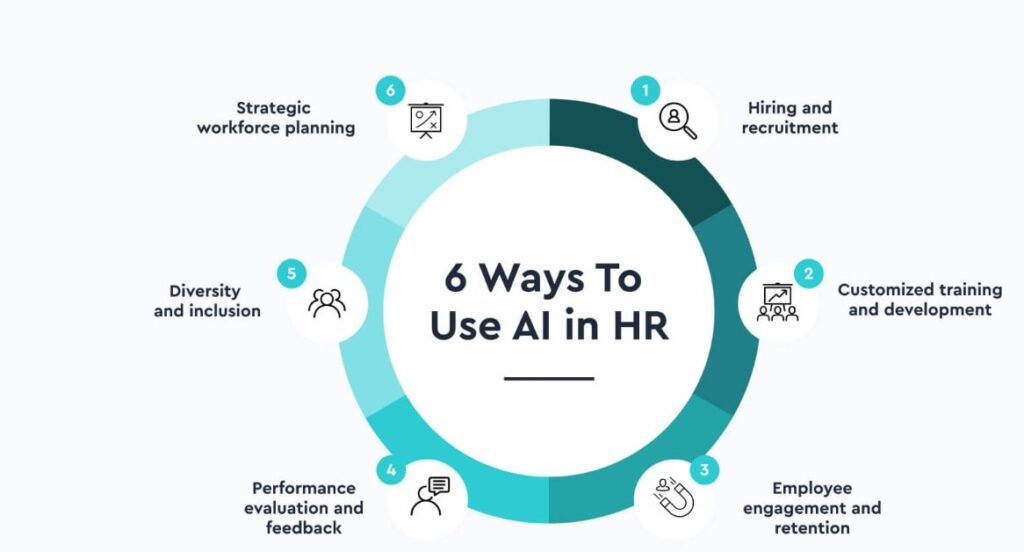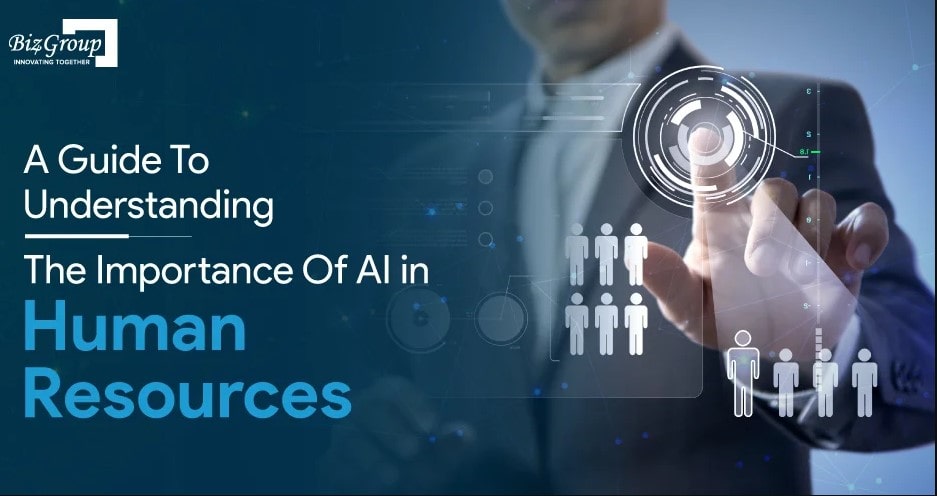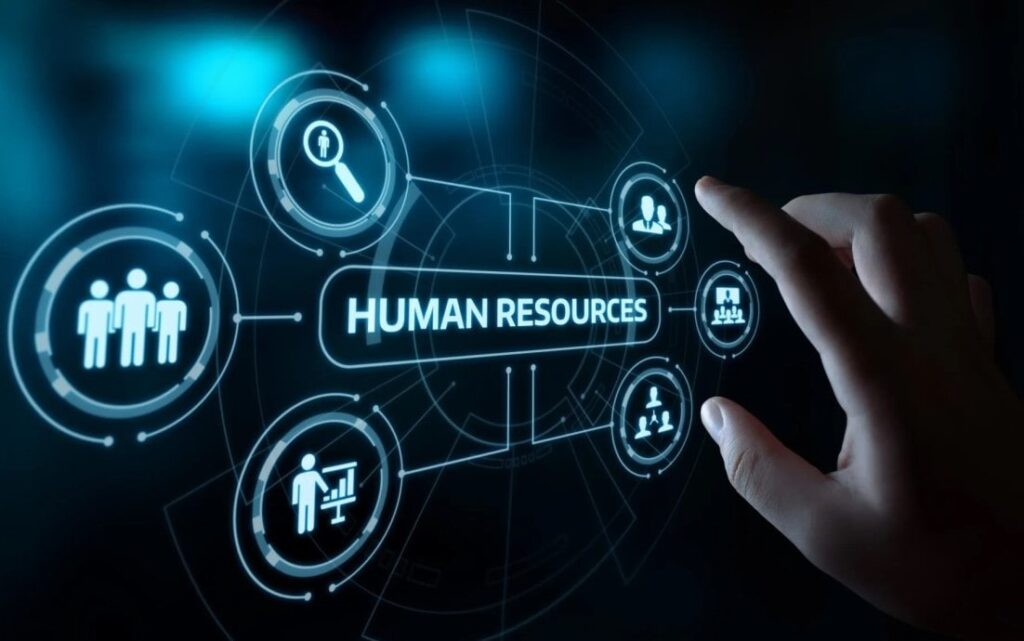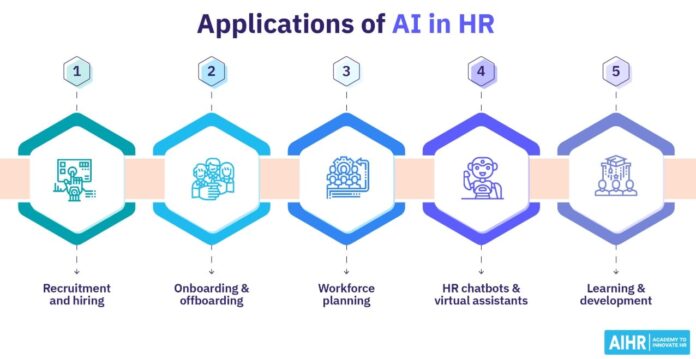By automating and improving crucial procedures, generative AI revolutionizes HR operations. It develops customized job descriptions, improves applicant sourcing by producing individualized outreach, and aids in hiring by screening resumes. AI chatbots provide round-the-clock support for employee inquiries, onboarding, and training. Additionally, generative AI creates personalized training materials and learning modules to enhance skill development. It creates predictive models for workforce planning, which helps with performance analysis and resource allocation. AI improves employee engagement with systems for recognition and tailored feedback. Generative AI increases productivity by decreasing manual chores and promoting strategic decision-making, freeing up HR professionals to concentrate on people-centric projects.
Table of Contents
The Role of Generative AI in HR Operations
Teams can automate tedious processes, analyze massive volumes of data, and enhance employee relationships using generative AI in HR operations. HR departments may increase worker engagement and corporate growth by using AI-driven solutions that decrease manual labor, provide deeper insights, and customize employee experiences.
Critical Benefits of Generative AI in HR Operations
Streamlined Recruitment: HR staff may concentrate on strategic goals by automating the first hiring steps, such as scanning applicants and doing preliminary interviews.
Data-Driven Decisions: Gives HR the ability to make proactive changes and enhance personnel management tactics by offering insights into workforce trends.
Improved Employee Experience: Offers individualized interactions based on each employee’s needs, personalizing HR messaging and engagement.
Enhanced Operational Efficiency: Lowers manual labor, boosting HR teams’ output and facilitating quicker reaction times.
From hiring to retaining employees, generative AI is a useful tool because of its capacity to increase operational efficiency.
AI Agents in HR: Transforming the Landscape

Digital assistants, known as AI agents in HR, use machine learning and natural language processing (NLP) to carry out a variety of HR duties either alone or in conjunction with HR personnel. As extensions of HR staff, these AI-powered solutions manage a variety of duties, including performance evaluations, employee onboarding, and candidate screening.
Types of AI Agents in HR
Talent Acquisition Agents: These agents expedite interview scheduling, automate applicant screening, and improve recruiting operations.
Employee Engagement Agents: Created to improve relationships at work, these agents assess employee input, send surveys, and customize messaging.
Learning and Development Agents: Put your attention on tailoring training and development programs to the skill sets, advancement, and career objectives of your staff.
Employee Support Agents: Act as a round-the-clock resource by responding to employee questions, handling HR requests, and offering advice on HR regulations.
By automating repetitive tasks, speeding up response times, and providing individualized employee experiences, AI agents in HR may help businesses improve workforce management.
AI Agents for Talent Acquisition: Enhancing Recruitment Processes

AI talent acquisition agents are revolutionizing the way businesses find, evaluate, and employ talent. These agents increase recruiting efficiency and provide HR teams the ability to make better hiring judgments by automating time-consuming procedures and offering insights on applicant fit.
Critical Functions of AI Agents in Talent Acquisition
Automated Resume Screening: Examines resumes and selects applicants whose credentials, experience, and abilities best fit the job criteria.
Chatbot Interaction with applicants: Uses chatbots to interact with applicants, answering their inquiries, giving them details about job roles, and helping them with the application process.
Interview Scheduling and Reminders: This lessens the administrative load on HR staff by scheduling interviews and reminding interviewers and candidates.
Testing and Skill Assessment: Tests candidates’ talents and suitability for the position by conducting skill evaluations.
Benefits of Using AI Agents for Talent Acquisition
Better Candidate Experience: By interacting with applicants quickly and giving clear instructions, AI agents make sure that the application process runs smoothly and favorably.
Enhanced Hiring Efficiency: By automating preliminary screening and evaluation, recruiters may concentrate on high-priority applicants.
Data-Driven Recruiting Decisions: Provides information about a candidate’s qualifications, lowering the possibility of prejudice and enhancing recruiting results.
Improved Diversity and Inclusion: Fosters a more inclusive and varied workforce by lowering unconscious bias in screening.
HR departments may more easily attract and retain top talent by using AI agents for talent acquisition, which streamlines and prioritizes the applicant in the recruiting process.
How Generative AI Empowers HR Operations with Predictive Analytics

Generative AI-powered predictive analytics is essential to HR operations. Generative AI can forecast patterns like employee attrition rates, hiring requirements, and skill shortages by evaluating previous data. This enables HR teams to proactively handle workforce issues.
Applications of Predictive Analytics in HR
Based on past data, employee retention predictions identify employees who are likely to leave, enabling HR to proactively deploy retention initiatives.
Workforce Planning: Predicts talent shortages, recruiting requirements, and workforce allocation to better match business objectives.
Performance Prediction: This tool allows for focused development programs by forecasting employee performance based on important factors.
Engagement and Satisfaction Monitoring: Supports early intervention by analyzing engagement data to find trends that point to discontent or burnout.
HR departments may develop individualized career pathways, make proactive changes, and promote a more encouraging work atmosphere by utilizing predictive analytics.
Applications of Generative AI for HR Operations
AI-driven tools are versatile, offering benefits across various HR functions. Here are some critical applications of generative AI in HR operations:
Recruitment Automation
By automating processes like resume screening, candidate outreach, and interview scheduling, generative AI simplifies the hiring process. AI-powered technologies are able to do preliminary interview evaluations, analyze social media profiles, and check resumes for skill relevance. Generative AI shortens the hiring cycle, improves applicant quality, and frees up HR personnel to concentrate on strategic hiring activities by decreasing manual procedures.
Employee Onboarding
AI agents may assist new hires with onboarding by supplying them with details on employment requirements, benefits, and corporate policies. They may also plan orientation courses, respond to frequently asked questions, and make new hires feel supported and welcomed right away.
Learning and Development
Training programs are tailored by generative AI according to skill levels, performance information, and employee responsibilities. AI agents may create individualized learning routes, suggest pertinent courses, and track progress to make sure workers have the skills necessary for professional advancement.
Performance Management
Through the analysis of employee accomplishments, skill development, and feedback data, AI systems may support performance reviews. AI agents help managers create fair, honest, and data-driven performance assessments that promote employee progress by offering real-time information.
Employee Engagement and Feedback
Through the analysis of sentiment data, exit interviews, and feedback surveys, generative AI promotes employee engagement. AI may assist HR teams in addressing issues by seeing patterns in employee happiness, which will improve retention and workplace morale generally.
Overcoming Challenges in Implementing AI in HR
Despite the numerous benefits, implementing AI for HR operations also presents challenges that organizations must address to ensure successful adoption.
Data Privacy and Security Concerns
Using AI technologies to handle sensitive employee data requires strong data security and adherence to laws like GDPR. To protect employee information, businesses must prioritize safe data storage and follow privacy laws.
Integration with Legacy Systems
It might be challenging to integrate AI technologies with current HR systems, especially in big firms with legacy infrastructure. Collaboration with IT and a staged strategy may guarantee a seamless integration.
Employee and Management Buy-In
Concerns about data utilization and job displacement may cause opposition to AI in HR. To build confidence and promote adoption, organizations should offer openness and training about AI tools.
Continuous Monitoring and Updates
For generative AI models to stay accurate and current, frequent monitoring and updates are necessary. As company requirements change, HR departments must prioritize ongoing development and modify AI parameters.
Future Trends in Generative AI for HR Operations
With new trends that will further influence how HR operations are conducted in the future, the potential of AI in HR keeps expanding.
Hyper-Personalized Employee Experiences: By comprehending each eConclusionmployee’s unique preferences, growth requirements, and engagement triggers, AI will help HR build individualized experiences. This will contribute to the development of a more customized and adaptable workplace.
Predictive personnel Acquisition: By using AI-powered technologies to forecast recruiting requirements, applicant fit, and skill sets, businesses can proactively hire personnel with a greater chance of success and retention.
AI will offer insights into employee career progression prospects, recognizing the abilities needed for promotion and proposing growth pathways. This will enable automated career pathing and succession planning. By providing workers with a clear path for advancement, this can increase retention.
AI-Driven HR Voice Assistants: Routine HR duties and questions may soon be handled by voice-activated AI assistants, giving staff members instant answers to questions about policies, benefits, and other HR services.
Constant Sentiment Analysis for Worker Contentment: Through a variety of channels, including emails, chat platforms, and feedback surveys, AI may continually assess employee sentiment via sentiment analysis. HR will be able to react quickly to shifts in employee morale thanks to this data.
Conclusion
A potent instrument for revolutionizing employee engagement and talent acquisition is generative AI for HR processes. Organizations may improve personnel management, expedite hiring, and make data-driven choices using AI HR agents. Specifically, by automating crucial procedures, enhancing the applicant experience, and minimizing prejudice, AI agents for talent acquisition are transforming the hiring process.
The advantages of generative AI in HR operations make it a worthwhile investment for companies dedicated to creating a flexible, effective, and engaged staff, even while issues like data protection and integration still exist. HR departments will continue to gain from cutting-edge technologies that boost productivity and enable HR professionals to provide a better employee experience as AI technology develops.




